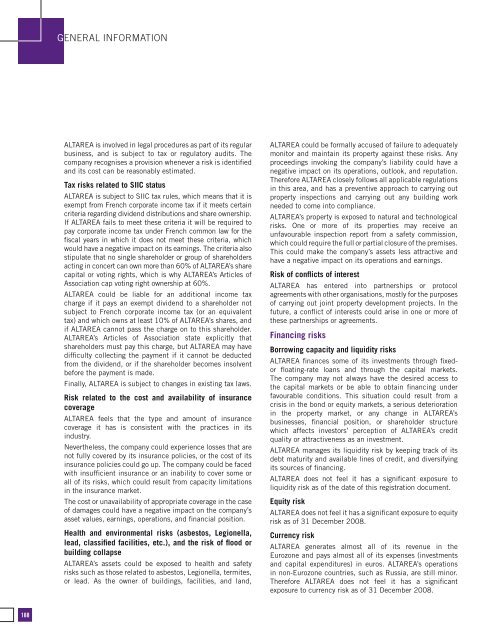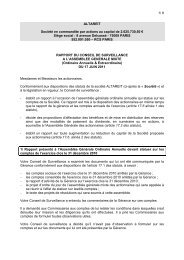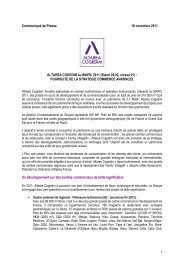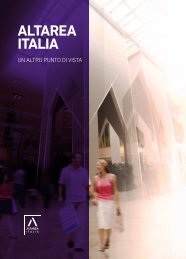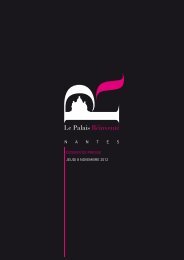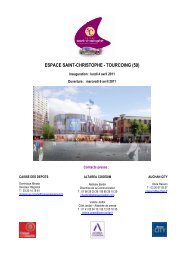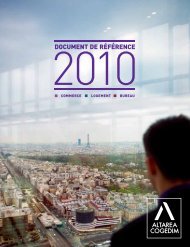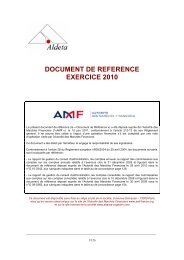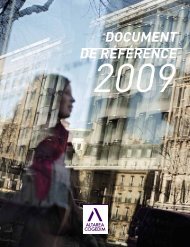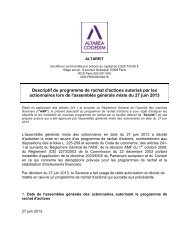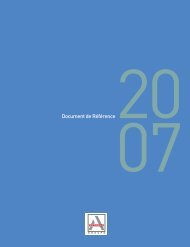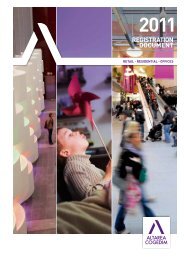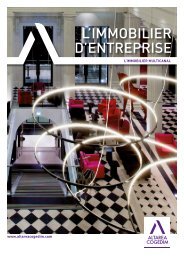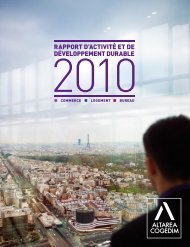Annual report 2008 - Altarea Cogedim
Annual report 2008 - Altarea Cogedim
Annual report 2008 - Altarea Cogedim
You also want an ePaper? Increase the reach of your titles
YUMPU automatically turns print PDFs into web optimized ePapers that Google loves.
General information<br />
ALTAREA is involved in legal procedures as part of its regular<br />
business, and is subject to tax or regulatory audits. The<br />
company recognises a provision whenever a risk is identified<br />
and its cost can be reasonably estimated.<br />
Tax risks related to SIIC status<br />
ALTAREA is subject to SIIC tax rules, which means that it is<br />
exempt from French corporate income tax if it meets certain<br />
criteria regarding dividend distributions and share ownership.<br />
If ALTAREA fails to meet these criteria it will be required to<br />
pay corporate income tax under French common law for the<br />
fiscal years in which it does not meet these criteria, which<br />
would have a negative impact on its earnings. The criteria also<br />
stipulate that no single shareholder or group of shareholders<br />
acting in concert can own more than 60% of ALTAREA’s share<br />
capital or voting rights, which is why ALTAREA’s Articles of<br />
Association cap voting right ownership at 60%.<br />
ALTAREA could be liable for an additional income tax<br />
charge if it pays an exempt dividend to a shareholder not<br />
subject to French corporate income tax (or an equivalent<br />
tax) and which owns at least 10% of ALTAREA’s shares, and<br />
if ALTAREA cannot pass the charge on to this shareholder.<br />
ALTAREA’s Articles of Association state explicitly that<br />
shareholders must pay this charge, but ALTAREA may have<br />
difficulty collecting the payment if it cannot be deducted<br />
from the dividend, or if the shareholder becomes insolvent<br />
before the payment is made.<br />
Finally, ALTAREA is subject to changes in existing tax laws.<br />
Risk related to the cost and availability of insurance<br />
coverage<br />
ALTAREA feels that the type and amount of insurance<br />
coverage it has is consistent with the practices in its<br />
industry.<br />
Nevertheless, the company could experience losses that are<br />
not fully covered by its insurance policies, or the cost of its<br />
insurance policies could go up. The company could be faced<br />
with insufficient insurance or an inability to cover some or<br />
all of its risks, which could result from capacity limitations<br />
in the insurance market.<br />
The cost or unavailability of appropriate coverage in the case<br />
of damages could have a negative impact on the company’s<br />
asset values, earnings, operations, and financial position.<br />
Health and environmental risks (asbestos, Legionella,<br />
lead, classified facilities, etc.), and the risk of flood or<br />
building collapse<br />
ALTAREA’s assets could be exposed to health and safety<br />
risks such as those related to asbestos, Legionella, termites,<br />
or lead. As the owner of buildings, facilities, and land,<br />
ALTAREA could be formally accused of failure to adequately<br />
monitor and maintain its property against these risks. Any<br />
proceedings invoking the company’s liability could have a<br />
negative impact on its operations, outlook, and reputation.<br />
Therefore ALTAREA closely follows all applicable regulations<br />
in this area, and has a preventive approach to carrying out<br />
property inspections and carrying out any building work<br />
needed to come into compliance.<br />
ALTAREA’s property is exposed to natural and technological<br />
risks. One or more of its properties may receive an<br />
unfavourable inspection <strong>report</strong> from a safety commission,<br />
which could require the full or partial closure of the premises.<br />
This could make the company’s assets less attractive and<br />
have a negative impact on its operations and earnings.<br />
Risk of conflicts of interest<br />
ALTAREA has entered into partnerships or protocol<br />
agreements with other organisations, mostly for the purposes<br />
of carrying out joint property development projects. In the<br />
future, a conflict of interests could arise in one or more of<br />
these partnerships or agreements.<br />
Financing risks<br />
Borrowing capacity and liquidity risks<br />
ALTAREA finances some of its investments through fixedor<br />
floating-rate loans and through the capital markets.<br />
The company may not always have the desired access to<br />
the capital markets or be able to obtain financing under<br />
favourable conditions. This situation could result from a<br />
crisis in the bond or equity markets, a serious deterioration<br />
in the property market, or any change in ALTAREA’s<br />
businesses, financial position, or shareholder structure<br />
which affects investors’ perception of ALTAREA’s credit<br />
quality or attractiveness as an investment.<br />
ALTAREA manages its liquidity risk by keeping track of its<br />
debt maturity and available lines of credit, and diversifying<br />
its sources of financing.<br />
ALTAREA does not feel it has a significant exposure to<br />
liquidity risk as of the date of this registration document.<br />
Equity risk<br />
ALTAREA does not feel it has a significant exposure to equity<br />
risk as of 31 December <strong>2008</strong>.<br />
Currency risk<br />
ALTAREA generates almost all of its revenue in the<br />
Eurozone and pays almost all of its expenses (investments<br />
and capital expenditures) in euros. ALTAREA’s operations<br />
in non-Eurozone countries, such as Russia, are still minor.<br />
Therefore ALTAREA does not feel it has a significant<br />
exposure to currency risk as of 31 December <strong>2008</strong>.<br />
188


